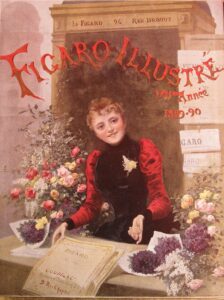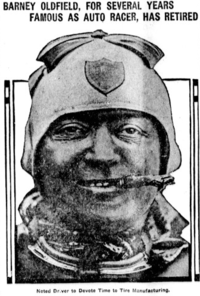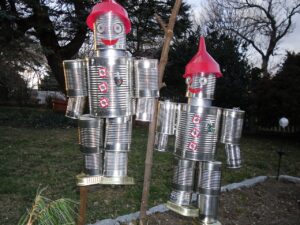By Elaine Viets

I needed everyday phrases for a project partly set in the early 20th century. Old words and phrases are clues to how people thought more than a hundred years ago. Conversation was more formal and swear words were rare. Here are a few lost words I found:
Tickled pink: My Aunt Tillie, who was as cute as her name, was “tickled pink to attend a party,” or hear about a wedding, a birth, or any other good news.

Puzzle bones and sauerkraut: My grandfather’s favorite meal: pork neck bones with boiled sauerkraut.

You drive like Barney Oldfield: In other words, really fast. More than a hundred years ago, pioneer race car driver Oldfield set a number of speed records, including the world speed record for driving 131.724 mph at Dayton Beach, Florida.

He’s a (real) daisy: A deadly insult men used to insult one another. Calling a man a daisy meant he was anything from a jerk to a prize scumbag – or worse. Women were never daisies, just Daisies.

Mutton dressed as lamb: An older woman dressed like a much younger one. A form of age-shaming.

Elbow grease: What you use when you clean vigorously. As in, “Plain old elbow grease will get rid of that ring around your bathtub.”

Frog strangler: A heavy rain.

Three sheets to the wind: Really drunk. As in, “He came home from the bar three sheets to the wind.”

Wound up like a clock: Overexcited. Before digital clocks and sugar highs, children who were running around inside the house and shrieking were “wound up like a clock.” This usually meant it was naptime.

Grass widow: A divorced woman. Divorced men can be grass widowers, but that phrase didn’t seem to be used as often.

Tinker’s dam: Mom wasn’t big on swearing, so she’d say, “I don’t give a tinker’s dam.” Mom thought she was avoiding the other D-word, but that may not be true. The Phrase Finder says, “There’s some debate over whether this phrase should be ‘tinker’s dam’– a small dam to hold solder, used by tinkers when mending pans, or ‘tinker’s damn’ — a tinker’s curse, considered of little significance because tinkers were reputed to swear habitually.”
Some experts sided with Mom. They said a tinker’s dam was a socially acceptable way to curse. But others dug out a sentence from John Mactaggart’s The Scottish Gallovidian Encyclopedia, from 1824, which said, “A tinker’s curse she did na care what she did think or say.”
The Phrase Finder says, “In the Grant County Herald, Wisconsin, 1854, we have: ‘There never was a book gotten up by authority and State pay, that was worth a tinker’s cuss.’
“So, we can forget about plumbing,” Phrase Finder concludes. “The earlier phrase simply migrated the short distance from ‘curse’ to ‘damn’ to give us the proper spelling of the phrase – tinker’s damn.”
Damn straight.

Six ax handles wide: Body shaming was big in the old days, too. A hefty woman was described as “six ax handles wide.”

Farting like a brewery horse: A condition presumably caused by the horses’ rich diet. Not sure that this phrase is entirely forgotten. Bud Light made the following commercial, where a girl’s hair is set on fire by a gas-passing sleigh horse. https://www.youtube.com/watch?v=nBU-lWs6Cn0
More brass than a government mule: One of my grandmother’s favorite phrases, to describe someone who is outrageously bold. As in, “He had no business being there, but that man has more brass than a government mule. He marched right in.”
 I have no idea where Grandma got that phrase. I’m pretty sure she never listened to the southern rock band, Gov’t Mule. Or heard legendary wrestling commentator Jim Ross say someone was “being beat like a government mule.”
I have no idea where Grandma got that phrase. I’m pretty sure she never listened to the southern rock band, Gov’t Mule. Or heard legendary wrestling commentator Jim Ross say someone was “being beat like a government mule.”
So where does that phrase come from?
Beats me.
Readers, what are your favorite lost words?

Well, I swow, Elaine, if that post don’t beat all! A lot of word origins are about as useless as the hind tit on a boar and aren’t worth a plug nickel, but these are the real McCoy!
“Decks awash” is a synonym for “three sheets to the wind.”
I’m writing this from memory. My grandfather was born in 1856, my mother in 1898, so many of these old expressions were still in use by elders as I was growing up. My grandad had a colorful way to accuse his 11 children of being lazy. On several occasions he told my mother, “You’ll never own a brick privy.” She allowed as how she never had. “It’s colder than Jehu” was another expression she used. My aunt talked about “busting a gusset” in the context of getting angry.
It’s late and I have to skedaddle, but I’ll probably remember a dozen more expressions before I snooze.
Now I feel like I’m in the living room with my great aunts. I forgot about “busting a gusset” and never heard of the brick privy line.
Obviously, you were an industrious child and never needed the enhanced motivation of that dire threat of potential brick-privy-deprivation.
That made me laugh. I was known for hiding in the bathroom when it was time to wash the dinner dishes.
That may be what Roger Price had in mind when he wrote his paper on “dynamic avoidance.”
Except I got caught. Every time.
Then I am not at all surprised that you never owned a brick privy.
Some of these expressions I still use. (Just how old am I?!) I was driving my daughter and her friend somewhere on a nice day and asked one of them to roll down her window. She had no idea how to “roll” down the window. She explained that you either open or close a window, not roll it.
I still say that too. LOL!
Me, too.
HHHowHHow many of us still dial our phones?
Guilty.
Great, Vera. I have a 10 year old grandson who wants to inherit my old beat-up ’85 Chevy pickup because it has roll up windows. The first time he was in the truck he couldn’t stop rolling the windows up and down.
I have an old car with two keys — one to open the door and one to start the engine. It baffles young car parkers.
Your post brings up a regret I have. I grew up on the east coast hearing numerous unique phrases (such as “tickled pink” mentioned above). There was a phrase for just about every occasion! 😎 I noticed when I moved west in 1997 that westerners didn’t appear to have a storehouse of unique phrases and I vowed to myself that I would sit down and make note of all the phrases I’d heard growing up.
Well you know the story–life got busy and I never did do that. And by now I’ve forgotten all but a few. I should sit down with my sisters and brainstorm a list. I just think it would be fun.
Something similar to this came up twice this week:
1) When someone tells me something like “I’m going to talk to him about that and get back to you.” Sometimes my automatic reply is “10-4.” We’ve reached a day and age where some don’t know what that means.
2) When growing up, if you were having trouble opening something, someone nearby would tease you and say “You’ve got to hold your face just right.” (a tongue in cheek way of acknowledging the difficulty opening whatever it is). Apparently few people these days ever heard that phrase.
In modern day, it feels more like we only know acronyms, not quaint turns of phrase. I’ll be curious to hear what other commenters have to say about their experiences.
Happily, I know what 10-4 means, and we used the phrase, You have to hold your face just right.
I remember when newbies were sent out to find a “sky hook.” Similar to “snipe hunting” when I was in school.
My grandfather referred to his car as the machine.
My children had to be taught what “look to your 10 o’clock” meant. They only can read analog time because Daddy wears an analog watch. Actually, they got me an Apple Watch. I have it set to an analog face. Cursive writing, I need to translate for them.
That’s what my Grandpa called his Studebaker, Alan. He washed “the machine” every Saturday.
I’m old enough so a lot of these are familiar to me.
Grass widow — I thought that referred to a woman whose husband spent far too much time on the golf course.
Thanks for the smiles this morning, Elaine.
I think that’s a “golf widow,” Terry.
Probably. Grass, golf. They both start with G, which is all my brain can handle.
Close enough for government work.
Yes. Actually, a grass widow is a woman whose partner is absent—not divorced. During the Raj, this was a common phrase used in the hill stations of India.
Totally not PC, but my MIL used to say, ‘He’s gonna do it, he doesn’t care if it harelips the gov’nor.’ Weirdest one I’ve ever seen.
Yep, you win the prize, Laura.
Pot licker. The old plumber who plumbed my family’s home in 1966 called anyone he was upset with a “pot licker.” No one had the courage to ask him which type of pot he was referring to. And whenever someone uses the phrase “you old fart,” I think of old Chappy.
Pot likker was also what was left in the pot after something was boiled. I think it was supposed to be “pot liquor.”
I’m a child of the 60’s. I still use the phrases “elbow grease” and “tickled pink.” For someone who was drunk, my mom used to say, “Well-oiled up.”
I liked “spifflicated.”
These are two I remember from my time up on the Cape.
Ham-and-egger-someone who doesn’t work more than he can get away with.
Built like a Portygee phone booth. That was to avoid saying “brick shit house”.
Good ones.
Interestingly, “daisy” was a backhanded compliment in the Old West. In Tombstone, a gunman tells Doc Holliday “I’ve got you now” and Holliday responds, “You’re a daisy if you do.” There’s a contemporaneous newspaper account quoting Holliday saying this.
The other great quote is “I’m your huckleberry.” It means, “I’m the man for the job.” (It does not refer, as some have suggested, to “huckles” on a casket. It is what it is.)
Pro tip: Use an old cliche in front of kids and they think you’re brilliant for inventing a new phrase.
Thanks for the morning laugh, Elaine!
Wonderful, fun post, Elaine. My mother used to use “kit and caboodle,” as in the whole thing. I’ve always been fond of “bamboozle.”
Both good ones, Dale Ivan. Bamboozle is fun to say.
If’n you are easily bamboozled, you might get hornswoggled, too.
As well as snookered and easily led up the garden path.
Two more of my favorites 😀
My contributions:
1. “Running around like a chicken with its head cut off.” Meaning engaging in unproductive or pointless activities, usually referred to children’s activities. And yes from personal experience as I prepared one for Sunday dinner, chickens do run around after their heads are cut off.
2. “Cat’s meow.” Meaning that’s swell.
3. “Bailing wire and chewing gum.” Meaning something was held together or mended in a slip-shod way.
4. “Jerry rigged.” Not politically correct these days but was perfectly acceptable during and after WWII when “made in Japan” was a put down indicating poor quality while war propaganda regarded the enemy as Jerries.
Breakfast calls, with a few minutes reflection I could come up with several more.
I remember all those, Lars, but weren’t “Jerries” the Germans? The Japanese were referred to as Japs, and other insulting terms.
I think an interpretation of that was “jury rigged” which was a term used in the days of sail to describe something of a temporary nature made up of materials at hand.
Kinda like fixing things with zip ties.
I have heard variations of jerry rigged of an unprintable nature that are “not fitten for polite company”, as my mother used to say.
“Kinda like fixing things with zip ties.”
Let’s not forget the all-purpose duct tape.
My relatives had a rich stockpile of sayings they could pull out on demand. Here are a couple:
“That don’t amount to a hill o’ beans.” This meant your argument (or whatever) isn’t worth anything. (I’m not sure how big a hill of beans is.)
“That dog won’t hunt.” About the same meaning as the hill o’ beans.
“if the creek don’t rise…” I’ll do what I say unless some unforeseen circumstance comes along.
Kay, I read somewhere that “if the Creek don’t rise” is a reference to a Creek Indian uprising/attack. So, “If the good Lord’s willing and the Creek don’t rise” means maybe you’ll accomplish your goal, and maybe not.
However, Wikipedia says that interpretation is “unlikely”.
I thought it meant, if there isn’t a major flood — as in creek, a small stream. Often pronounced “crick” in my neck of the woods.
Definitely remember the hill o’ beans and the dog.
Bob’s your uncle. Meaning “and there it is.” The wiki on the possible origin of that phrase is hilarious.
“Bob’s your uncle” is a Britishism, not an old US expression.
The 1926 (+/-) Edition of Brittanica had an entire entry on Americanisms.
Man, I’d love to get my hands on that edition of Brittainica.
I have the 1929 and the 1962 editions. “Americanisms” is found in the ’29 version and “Americanization” in the ’62, instead.
Where are you located?
Hollywood, FL
Wrong Hollywood. Sorry.
My great grandma used to say, “You lie like a trottin’ dog” and I always wondered what that meant. My mom used to call someone “punkin’ eater” as a term of endearment, probably from Peter Peter pumpkin eater. My grandfather was part of the dust bowl generation who went west to pick cotton, so I grew up hearing phrases like, “Have you lost your cotton-pickin’ mind?” I never even thought about what it meant until years and years later.
My grandma also said “cotton-pickin”
How about: You lie like a rug.
“You lie like a trottin’ dog” was probably a polite variant of “You lie like a rottin’ dog.”
What a fun post, Elaine! Thanks for the giggles.
Cute as a button. I never understood why anyone would think a button is cute.
Snug as a bug in a rug. Seems more dangerous than cozy. LOL
How about “cute as a bug’s ear”? And did you ever listen to the words to “rock-a-bye, Baby”? Those should give a kid nightmares.
OMG, yes! Many of the old nursery rhymes are downright terrifying. No wonder we grew up with thick skin. LOL
According to H. Allen Smith*, a journalist had a photomicrograph taken of an actual bug’s ear. It was totally disgusting. He’d brandish the photo about anytime someone was said to be “cute as a bug’s ear.”
*Author of “The Compleat Practical Joker.”
I like that!
Elaine, thanks for the funnies this morning.
Here’s one my mom used to say to us when we were growing up.
It’s a mighty long worm that doesn’t turn. 🙂
I think it meant something like “you’ll get yours in the end”, or some such.
Thank you all for posting. This has been fun and educational.
I’m a bit late to the party but I have a couple of them you may not have heard. I’m from a very small town and there were some regional sayings that are little known or completely unknown anywhere else.
1. Ignert: No not ignorant. It also has a completely different meaning. It meant rude, i.e. “Don’t be ignert.” Don’t bother looking it up. It is not a real word.
2. When I was a child and would ask for my mother to buy me something, her response was, “I’m too poor to buy a pissant a pair of leggins!” She told me her grandfather used to say this.
Welcome, Rebecca. I used to say, “Don’t be ignert,” to my little brother.
I remember most of these phrases, though I never heard “six ax handles wide” applied to people, only the distance between Babe the Blue Ox’s eyes. Then again, I grew up in Minnesota, Paul Bunyan’s stomping grounds.